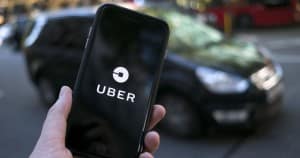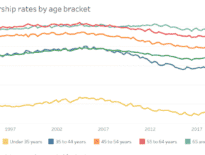The MBTA went without $23 million last year in potential fare revenue from riders who decamped from the ailing public transit network for ride-hailing services such as Uber and Lyft, according to a new report that also put a big estimate on the net carbon footprint of the companies.
As use of the platforms continues to expand at a rapid rate, the Metropolitan Area Planning Council – which has previously advocated for imposing higher fees on them – concluded in research released Monday that, without further regulation, “unchecked growth” of transportation network companies will make it more difficult to rein in greenhouse gas emissions and will continue to siphon money away from other transportation needs.
“We already know that TNC services are siphoning riders and dollars from public transit, but now we can see clearly that they leave an impact on our congestion as well as our air quality,” MAPC Deputy Director Rebecca Davis said in a statement. “Clearly we need to do more to promote shared trips when users choose these services, while advocating for better walking and biking infrastructure and safe, reliable public transit.”
The MAPC based its research on 2018 data released by the state last month, which counted about 81 million trips on ride-hailing services, a 25 percent jump over the year before.
Many commuters who take Uber or Lyft also have access to public transit – more than half of the rides last year started in Boston alone, according to state data – but some opt against it because of travel time, distance between stations and their destinations, or frequent delays and service disruptions. The money the T lost to these transportation network companies, or TNCs, is almost equal to the money it will bring in with its recent, unpopular fare hikes.
MAPC researchers also estimated the greenhouse gas impacts caused last year by TNCs, multiplying the number of miles driven on trips that replaced non-polluting alternatives by federal standards on carbon-dioxide emissions.
After accounting for trips that would have been made by car regardless of public transit options, the MAPC concluded that ride-hailing services contributed a net 96,340 metric tons of carbon dioxide equivalents last year, a “conservative estimate” that does not include time when drivers do not yet have passengers.
“This net carbon footprint is approximately 0.6 percent of the carbon emissions estimated for the Massachusetts passenger vehicle fleet in 2016,” the report stated. “In other words, even as the state is working to implement policies that will encourage more sustainable modes of transportation, it is experiencing rapid growth in an industry that is adding to the carbon impact of the state.”
Lyft spokeswoman Campbell Matthews said in a statement that the MAPC’s report is “based on a wholly inaccurate understanding of the industry.” While the company still has many drivers operating traditional gasoline vehicles, it announced last year that it would purchase enough carbon offsets to make 100 percent of its rides carbon-neutral.
“Research shows that rideshare users are more likely to use public transit than non-rideshare users, which is why we’ve added MBTA information into the Lyft app to encourage public transit use,” Matthews said. “Additionally, the report showed notable growth in TNC rides in areas underserved by other transportation options. We look forward to sharing this information with MAPC and providing valuable insight into Lyft’s impact on our communities.”
Lyft also argued that the study does not sufficiently acknowledge the role of privately owned vehicles, which still constitute far more trips on roadways than all TNCs combined.
In areas where ride-hailing services are most popular, though, public scrutiny has been increasing. Forty-five percent of registered Boston voters in a June poll said they believe the platforms have made congestion worse, compared to 36 percent who saw no difference.
Some lawmakers have been calling for higher fees on the services, aiming both to generate additional revenue to address unmet transportation needs and to lessen traffic woes by driving passengers into shared rides or public transportation. Those bills, which were weighed at a Tuesday hearing, have the backing of the MAPC.






